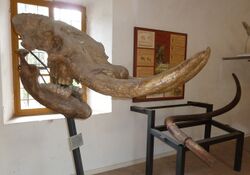Biology:Haplomastodon
| Haplomastodon | |
|---|---|

| |
| Skull of H. chimborazi | |
| Scientific classification | |
| Kingdom: | |
| Phylum: | |
| Class: | |
| Order: | |
| Family: | |
| Genus: | †Haplomastodon Hoffstetter 1950
|
| Species | |
|
See text | |
| Synonyms | |
|
Notiomastodon Mothé et al. 2013 | |
Haplomastodon is a dubious extinct genus of proboscidean endemic to South America during the Pleistocene from 1.810 million to 11,000 years ago, living for about 1.8 million years.[1] Haplomastodon is considered synonymous with Notiomastodon by some researchers.[2][3]
It had two tusks on either side of a trunk like other members of the Gomphotheriidae. Its apparent range was from Venezuela southward to Argentina , where fossils were recovered in the Suelo Formation, a quarry dig in Corrientes Province.[4] Fossil remains described as Haplomastodon waringi have been found in Soatá in the department of Boyacá in Colombia.[5]
Species
- †H. guayasensis Hoffstetter 1952
- †H. chimborazi Proaño 1922
- †H. waringi Holland 1920
Taxonomical revision
Haplomastodon was named by Hoffstetter in 1950. It was assigned to Gomphotheriidae by Carroll (1988). Researchers from Rio de Janeiro University proposed in 2013 that all Haplomastodon species should be reassigned to one single species, Notiomastodon platensis.[2]
Distribution
References
- ↑ Paleobiology database: Haplomastodon basic info
- ↑ 2.0 2.1 Mothé, Dimila; Avilla, Leonardo S.; Cozzuol, Mário; Winck, Gisele R. (25 October 2012). "Taxonomic revision of the Quaternary gomphotheres (Mammalia: Proboscidea: Gomphotheriidae) from the South American lowlands". Quaternary International 276-277: 2–7. doi:10.1016/j.quaint.2011.05.018. Bibcode: 2012QuInt.276....2M.
- ↑ Mothé, Dimila; dos Santos Avilla, Leonardo; Asevedo, Lidiane; Borges-Silva, Leon; Rosas, Mariane; Labarca Encina, Rafael; Souberlich, Ricardo; Soibelzon, Esteban et al. (30 September 2016). "Sixty years after 'The mastodonts of Brazil': The state of the art of South American proboscideans (Proboscidea, Gomphotheriidae)". Quaternary International 443: 52–64. doi:10.1016/j.quaint.2016.08.028.
- ↑ Álvarez, B.B. (1974). "Los Mamíferos Fósiles del Cuaternario de Arroyo Toropi, Corrientes (Argentina)". Ameghiniana 11 (3): 295–311.
- ↑ Soatá in the Paleobiology database
Further reading
- Ranzi, Alceu. Paleoecologia da Amazonia - Megafauna do Pleistoceno. Florianópolis,. Editora da UFSC, 2000.
Wikidata ☰ Q11682338 entry

